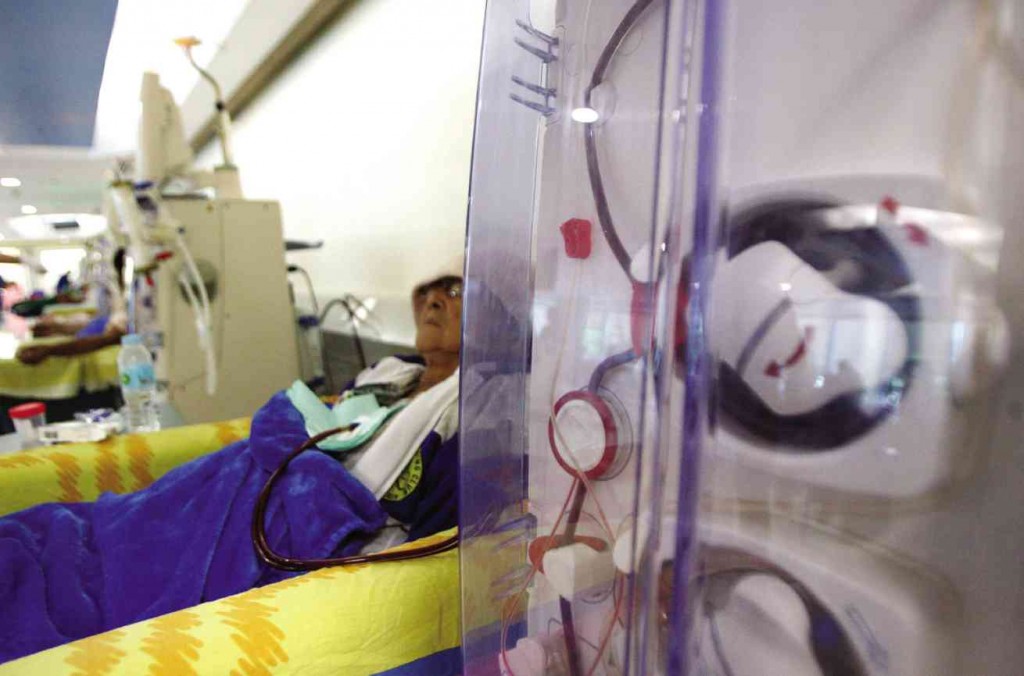Know what to do about kidney stones

STAY as far away as possible from this dialysis machine by avoiding cholesterol-rich food like beef, pork, poultry and fish; and by drinking adequate amounts of water. LYN RILLON
They are often taken for granted. But nature knows that this organ is so important, it gave us a pair.
Kidneys serve a multitude of purposes so essential to the proper function of our bodies. They collect waste and inorganic materials; they help regulate electrolytes, maintain the acid-base balance and help regulate blood pressure; and they filter blood.
To make the public more aware of the importance of our kidneys, the government, through Proclamation No. 184 in 1993, declared June as the National Kidney Month.
This year, the National Kidney and Transplant Institute has worked together with the Philippine Society of Nephrology and the Philippine Urological Association to hold activities, while the Renal Disease Control Program has coordinated with the Department of Health-Centers for Health Development for conducting regional activities.
High costs
Dr. Ricky Quintos II, head of NKTI-Public Information Office, shared with GMA-7 News recently what we can do to keep our kidneys functioning well: Drink adequate amounts of water; avoid cholesterol-rich and salty foods; and exercise regularly. He also reminded viewers about the high costs of diseased kidneys—including lifelong dialysis treatment to remove toxins and excess fluids from the body that cost upward of P4,000 per session.
Diet, in particular, has been shown to play a significant role in the overall state of our kidneys, particularly in the formation of kidney stones—solid crystal aggregation formed in the kidneys from dietary minerals in the urine. Grown to sufficient size, kidney stones can be extremely painful and may obstruct the ureter.
In the mid-1960s, Prof. WG Robertson of the Medical Research Council in Leeds, England, and among the world’s foremost experts on diet and kidney stones, was able to establish the stunning relationship between animal protein consumption and the formation of kidney stones. Robertson has authored and coauthored at least 100 scientific publications on the subject.
Animal protein
One of the studies published in the Journal of Chronic Disease 32 (1979) pages 469-476, titled “Dietary Changes and the incidence of Urinary calculi in the United Kingdom between 1958 and 1976” showed an association between animal (meat, fish and poultry) protein intake and formation of urinary calculi.
“The China Study” coauthor T. Colin Campbell, a Jacob Gould Schurman professor emeritus of Nutritional Biochemistry at Cornell University, revealed in an Inquirer Science/Health interview that one of Robertson’s charts—derived from a study involving UK subjects during the years 1958 to 1973—showed that consuming animal protein at levels above 21 grams per person per day (slightly less than one ounce) closely correlated with a high number of kidney stones formed per 10,000 individuals per year.
Campbell explained that although Robertson’s research team had identified six risk factors for kidney stones, animal protein consumption was singled out as the major culprit. Consumption of animal protein at levels commonly seen in affluent countries has led to the development of four of the six risk factors for forming kidney stones.
In Robertson’s studies, shown in a seminar in Toronto, not only is animal protein linked to risk factors for future formation of stones, but contributes to recurring stones as well.
Robertson published findings showing that, among the patients who had recurrent kidney stones, he was able to resolve their problem by simply shifting their diet away from animal protein foods.
Other studies of Robertson citing animal protein as the culprit in the formation of kidney stones included published studies in the British Journal of Urology. These are: “Risk factors in calcium stone disease of the urinary tract”; “Epidemiological risk factors in calcium stone disease”; “Should recurrent calcium oxalate stone formers become vegetarians?”.














